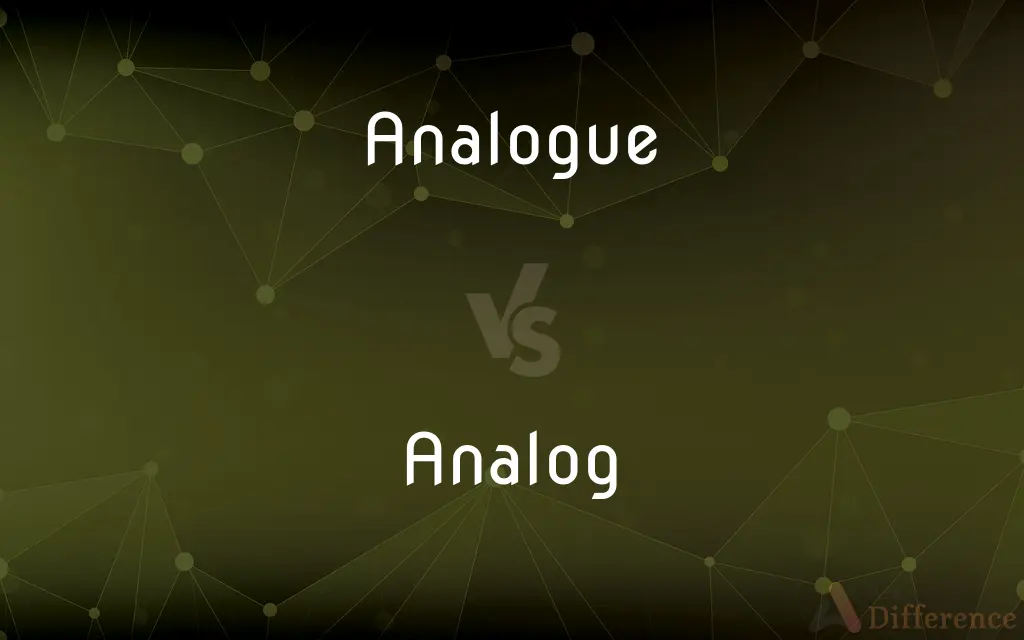Analogue vs. Analog — What's the Difference?
Edited by Tayyaba Rehman — By Maham Liaqat — Updated on March 18, 2024
Analogue refers to a continuous signal or representation, while analog is its American spelling variant, used in the same contexts.

Difference Between Analogue and Analog
Table of Contents
ADVERTISEMENT
Key Differences
Analogue and analog essentially describe the same concept—technology or devices that interpret signals or information represented by a continuous range of values. While "analogue" is preferred in British English, "analog" is the American English spelling, used in contexts such as analog watches, analog recording, and analog electronics. Both terms denote systems where information is represented by physical quantities, in contrast to digital systems where information is encoded as discrete values.
Analogue systems, such as vinyl records and analog clocks, rely on physical phenomena to represent information, often resulting in a more natural, albeit less precise, reproduction of sound and time. Whereas digital technology, which is not part of this comparison but essential for context, uses binary code to represent information, leading to higher precision and easier replication. Analog technology, on the other hand, can provide a seamless representation of data, capturing nuances and variations that digital technology might compress or omit.
In the realm of electronics, analogue signals are susceptible to degradation from noise and interference over distance, which can affect the quality of the signal. Analog electronics, therefore, require careful design to minimize these effects and maintain signal integrity. This contrasts with digital systems, where signals can be regenerated to their original state without degradation, making digital more robust over long distances.
Analogue devices, such as traditional watches with hands that move continuously around the dial, offer a direct representation of time, reflecting the natural, cyclical nature of time measurement. Analog devices, following the same principle, emphasize a direct and intuitive understanding of information, such as speedometers in cars that provide a visual representation of speed through the position of a needle.
In the field of photography, analogue cameras capture images on film through chemical processes, requiring development for the images to be visible. Analog photography is valued for its aesthetic qualities, including grain and color rendition, which differ significantly from the precise, clean images produced by digital cameras.
ADVERTISEMENT
Comparison Chart
Spelling Variants
Preferred in British English
American English spelling
Representation of Information
Continuous signal or values
Continuous signal or values
Usage Contexts
Vinyl records, analog clocks
Analog watches, analog recording
Susceptibility to Noise
More susceptible, requiring careful design
More susceptible, requiring careful design
Nature of Representation
Direct and often natural reproduction
Direct and often natural reproduction
Compare with Definitions
Analogue
A device or system that uses analog processes.
The studio still uses analogue equipment for music production.
Analog
Used in American contexts to describe technology based on analog signals.
Analog devices like vinyl players are making a comeback.
Analogue
Pertaining to analog computing, using physical phenomena to represent calculations.
Early computers were analogue, relying on mechanical parts for computation.
Analog
American spelling for analogue, indicating a continuous form of representation.
His collection includes an analog watch from the 1950s.
Analogue
In chemistry, a compound with a structure similar to another but differing in composition.
Analogue drugs can mimic the effects of the original substance.
Analog
In electronics, referring to circuits or devices that handle analog signals.
The engineer specializes in analog circuit design.
Analogue
Relating to or using signals or information represented by a continuously variable physical quantity.
An analogue clock displays time with moving hands.
Analog
Pertaining to physical systems that model or mimic other systems.
The analog computer calculated flight paths for early space missions.
Analogue
Related to analog photography, using film to capture images.
She prefers the warmth of analogue photography.
Analog
Relating to non-digital methods of recording or reproducing sound.
Analog audio recordings have a distinctive warmth.
Analogue
Relating to or using signals or information represented by a continuously variable physical quantity such as spatial position, voltage, etc.
Analogue signals
The information on a gramophone record is analogue
Analog
Something that bears an analogy to something else; something that is comparable
“Titan, Saturn's giant moon … seems like an analog of the environment of Earth on the eve of life” (David Grindspoon).
Analogue
Variant of analog.
Analog
(Biology) An organ or structure that is similar in function to one in another kind of organism but is of dissimilar evolutionary origin.
Analogue
(mostly Commonwealth) analog
Analog
(Chemistry) A structural derivative of a parent compound that often differs from it by a single element.
Analogue
(mostly Commonwealth) analog
Analog
Of, relating to, or being a device in which data or a signal is represented by continuously variable, measurable, physical quantities, such as length, width, voltage, or pressure.
Analogue
That which is analogous to, or corresponds with, some other thing.
The vexatious tyranny of the individual despot meets its analogue in the insolent tyranny of the many.
Analog
Done, happening, or existing in the physical world rather than on an electronic device
Analog strategy games.
Analog friendships.
Analogue
A word in one language corresponding with one in another; an analogous term; as, the Latin "pater" is the analogue of the English "father."
Analog
(of a device or system) In which the value of a data item (such as time) is represented by a continuous(ly) variable physical quantity that can be measured (such as the shadow of a sundial).
An analog watch
Analogue
An organ which is equivalent in its functions to a different organ in another species or group, or even in the same group; as, the gill of a fish is the analogue of a lung in a quadruped, although the two are not of like structural relations.
Analog
Not relating to, or pre-dating, digital technology such as computers and the Internet; relating to real life.
An analog (paper) map
Analogue
Something having the property of being analogous to something else
Analog
(countable) Something that bears an analogy to something else.
Analogue
Of a circuit or device having an output that is proportional to the input;
Analogue device
Linear amplifier
Analog
An organ or structure that is similar in function to one in another kind of organism but is of dissimilar evolutionary origin.
Analog
(chemistry) A structural derivative of a parent compound that differs from it by only one or a few atoms or substituent groups; (usually, especially) such a molecule that retains most of the same chemical properties.
Insulin analogue
Analog
Something having the property of being analogous to something else
Analog
Of a circuit or device having an output that is proportional to the input;
Analogue device
Linear amplifier
Common Curiosities
Can analogue devices be used in modern technology?
Yes, analogue devices are still used in modern technology, especially in areas where continuous signal representation is preferred, such as audio equipment and watches.
What is the main difference between analogue and analog?
The main difference is the spelling: "analogue" is used in British English, while "analog" is the American English variant. Both refer to systems or devices that use continuous signals or values for representation.
How do analog electronics work?
Analog electronics process continuous signals through electronic components like resistors, capacitors, and transistors to amplify, filter, or convert these signals.
Why do some musicians prefer analog recording methods?
Some musicians prefer analog recording for its warmth, character, and the way it captures sound nuances differently from digital recording.
Are analogue signals better than digital signals?
"Better" depends on the context. Analogue signals can provide a more natural and seamless representation, but they are more susceptible to noise and degradation over distance compared to digital signals.
Is there a difference in the functionality of analogue and analog devices?
No, the functionality of analogue and analog devices is the same; the difference lies in the regional spelling preferences.
Why might someone prefer analogue photography over digital?
Someone might prefer analogue photography for its aesthetic qualities, such as grain, color rendition, and the physical process of developing film, which are distinct from digital photography.
What are common examples of analogue technology?
Common examples include vinyl record players, analogue clocks, and film cameras.
Can digital devices replicate analogue signals?
Digital devices can approximate analogue signals by sampling at a high rate and using digital-to-analog converters, but some nuances of the analogue signal may be lost.
Are analog watches more accurate than digital watches?
Digital watches are generally more accurate than analog watches because digital timekeeping technology can precisely segment time without the mechanical limitations of analog mechanisms.
Can analogue and digital technologies be combined?
Yes, many systems combine analogue and digital technologies to leverage the advantages of both, such as in audio recording and signal processing.
Why are analogue signals prone to degradation?
Analogue signals are prone to degradation because they can be affected by noise, interference, and loss in transmission or conversion, impacting the quality of the signal.
Is analog electronic design more complex than digital?
Analog electronic design can be more complex due to the need to handle continuous signals and the sensitivity to noise and interference, unlike digital design's binary nature.
Do analog signals have an advantage in audio quality?
Some argue that analog signals provide a richer, more authentic audio experience by capturing all nuances of sound, a quality sometimes perceived as lost in digital compression.
Can analogue systems be more aesthetically pleasing?
Many people find analogue systems, like vinyl records or film photography, more aesthetically pleasing due to their tangible, physical nature and the perceived warmth or authenticity of the experience.
Share Your Discovery

Previous Comparison
Stanch vs. Staunch
Next Comparison
Configuration vs. SetupAuthor Spotlight
Written by
Maham LiaqatEdited by
Tayyaba RehmanTayyaba Rehman is a distinguished writer, currently serving as a primary contributor to askdifference.com. As a researcher in semantics and etymology, Tayyaba's passion for the complexity of languages and their distinctions has found a perfect home on the platform. Tayyaba delves into the intricacies of language, distinguishing between commonly confused words and phrases, thereby providing clarity for readers worldwide.
















































